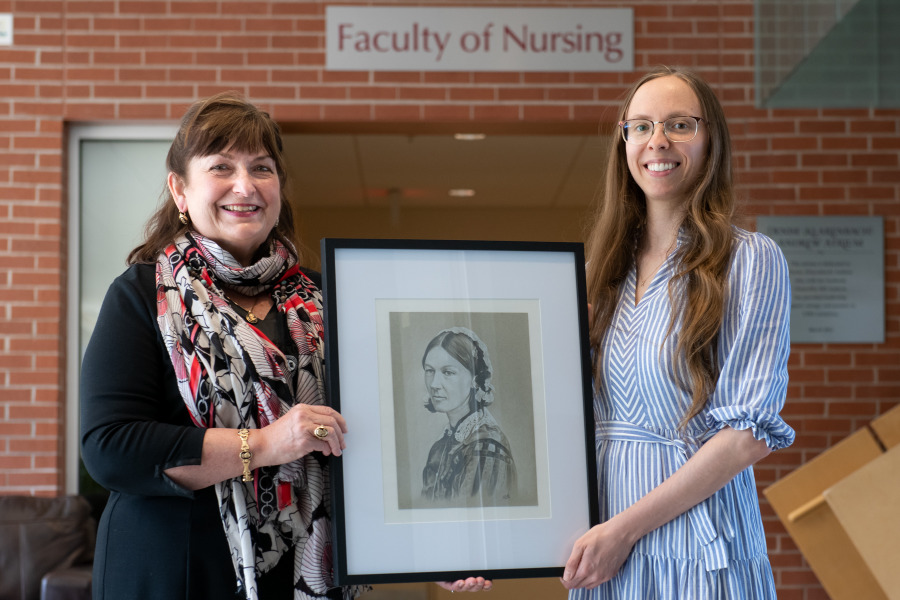UPEI graduate presents portrait of Florence Nightingale to Faculty of Nursing

Hanging in a place of honour in the Faculty of Nursing at UPEI is a black and white portrait of Florence Nightingale (1820–1910), the famous British nurse known as the founder of modern nursing.
The portrait was presented to Dr. Jo-Ann MacDonald, interim dean of nursing at UPEI, on May 12—National Nursing Day—by Katarina McCourt, a visual artist and a graduate of UPEI’s honours history program.
“Through her ground-breaking work, determination, and courage under adversity, Florence Nightingale laid the foundation for the nursing profession of today,” said MacDonald. “I thank Katarina for her beautiful portrait of the founder of nursing. We are very pleased to give it a home in the Faculty of Nursing.”
Nightingale became famous as a nurse during the Crimean War (1853–1856), working under horrific conditions to save sick and wounded soldiers. Her experiences during that war were foundational in her views about the importance of proper sanitation to recovery from illness or injury and to the maintenance of good health. After the war, she established St. Thomas’s Hospital and the Nightingale Training School for Nurses in 1860—the first professional institutions dedicated to educating and training qualified nurses. Her work greatly influenced the quality of health care in the 19th- and 20th centuries.
Last year, McCourt wrote her honours thesis about Nightingale, but she took an unusual approach to the famous nurse, exploring how social class, the popular press, gender relations, and other factors influenced artists’ interpretations of Nightingale.
A typical example, said McCourt, is an article in the London Times, which includes a print of an engraving of Nightingale, that describes her as a “ministering angel.” While paintings created by prominent artists from the Royal Academy honoured Nightingale’s successes in Crimea, the way she was displayed directly correlated with the media’s interpretation of her.
In her investigation of primary and secondary sources of Nightingale’s interactions with other medical professionals and high-profile figures, McCourt detected “a noticeable contrast between the nurse’s personality and the way she is presented in paintings and artworks.”
“Deeply involved and dedicated to her line of work, Nightingale saw the media and artists and their embellished depictions of her as something distracting and unnecessary. Her work was motivated by her religious faith, her strong organizational skills, and her aversion to media attention. Nightingale was no stereotype of a submissive, gentle woman.”
However, said McCourt, despite Nightingale’s concern with artists and the media’s power over her image, visual artwork helped to develop and promote her image. This positive perception further popularized Nightingale and drew attention to her campaign to have nursing recognized by society as an important part of the medical profession, which led to training and educational opportunities for nurses.
With encouragement from her supervisor, UPEI history professor Dr. James Moran, McCourt created the portrait of Nightingale to complement her thesis. Using a photograph of Nightingale for reference, McCourt drew her likeness on grey-toned paper, which allows for greater play of light and shadow, using graphite and white pencil and white pastel chalk. Her goal was to depict Nightingale’s stern, commanding, and business-like character but to contrast that harshness with a soft gradient background, and softer lines and edges on her clothing.
“Florence Nightingale’s legacy still lives on in the hearts and minds of those who follow her path of healing and medicine in nursing,” said McCourt. “Artists and historians have also shown great admiration for Nightingale in their attempts to preserve and bring her accomplishments to light through written material and visual art. I hope that this 21st century depiction of Florence Nightingale will continue to inspire nursing students.”